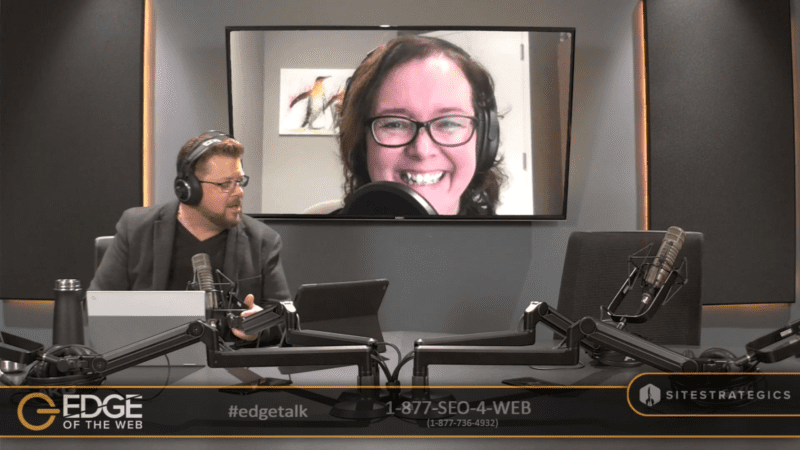Keeping up with the latest digital marketing news is easy when you join EDGE host Erin Sparks and Creative Studio Producer Jacob Mann for the news roundup segment of the EDGE of the Web podcast with all the latest headlines. In Episode 324, special guest Marie Haynes of Marie Haynes Consulting makes sense of the latest digital marketing news from the EDGE:
Google to pay up to $200M to settle FTC YouTube investigation
According to Margaret Harding McGill on Politico, Google to pay up to $200M to settle the FTC YouTube investigation. “YouTube/Google to pay fine because they had ads targeting minors, based on the collection of personal data which violates the Children’s Online Privacy Act.”
- Erin Sparks: FTC voted three to two along party lines who approve the settlement. It’s part of the FTC’s latest series of moves to crack down on the big tech companies for privacy violations. Facebook recently paid a $5 billion fine to resolve an expansive agency probe into its data practices. So, what’s going on here, Marie?
- Marie Haynes: I have little children, so this is really important to me. When we first started using YouTube for them, you’d search for Dora the Explorer videos and end up getting a bunch of very adult content. That has gotten better. And when it comes to ads, I think anything that can be done to better protect children is a good thing.
- Erin Sparks: Yes, I have four kids myself, and it’s hard to really police what kind of content they end up being exposed to, even if by accident. But I also don’t want government regulation to go too far.
- Marie Haynes: I’ve taught my children how to close ads they don’t want to see, and to tell us about content that doesn’t seem right to them. But I think the point I’m trying to make is the people who need to police what our children see are us, their parents. But of course we also want Google to do more as well, and if it takes the government stepping in to make that happen, then so be it.
Signs Of A Google Search Ranking Algorithm Update On August 29th
On Search Engine Roundtable, Barry Schwartz reports on Signs Of A Google Search Ranking Algorithm Update On August 29th. “There are signs of a Google search ranking update touching down late August 28th through August 29th. There is both forum chatter within the SEO industry and the rank checking tools also.”
- Erin Sparks: What do you think Marie, did something significant take place here recently?
- Marie Haynes: The tricky thing to determine here is whether this is an algorithm update or whether it’s due to the long weekend. With something like the Labor Day weekend, a lot of things change. For example, a website that’s all about back-to-school products is going to naturally look very different over the long holiday weekend. So far from what we’ve had a chance to look at, it looks more like a natural phenomenon than some kind of update or change at Google. And Google has also been pretty good about announcing core updates ahead of time, and nothing was announced from Google heading into the long holiday weekend. If there was an update, then it was probably just an extra tweak to a previous major update. A couple of client sites for whom we recently filed very thorough disavows did see a surprising jump, but it’s too limited to conclude that some kind of link-related update or change was made.
- Erin Sparks: You’re a big proponent of using the disavow tool, right?
- Marie Haynes: Yes, of using it appropriately. A lot of people do really stupid things with their disavow files. You don’t have to waste time disavowing links that are clearly very spammy such as link directories because Google already knows to just ignore those. But if your site went through a period where you had a lot of guest posting or if you paid for links, disavowing those seems to have a significant effect, though we rarely do only that, so it’s hard to isolate the effect of disavows from other things we do to improve site quality. Use the disavow tool to correct for past not-so-great SEO tactics that resulted in links to your site from places Google doesn’t like. I also pay close attention to any significant companies and marketing agencies, such as Dejan SEO most recently, that get a manual action from Google because it’s a sign that Google has caught onto something that’s working that it’s algorithm can’t stop it – yet. You can bet they’re going to figure out how to address it algorithmically. Dejan had a particular piece of content about marketing from Stanford University on its site, and it generated so many links to it that it probably just made Google wonder if some of them were paid links, and then when Google saw all the other kind of marketing experiments being run on the site, it just got them into trouble. But it’s scary because what if you’ve got something on your site that you think is generating links in a totally natural way but Google thinks otherwise? It gets very tricky.
Google’s John Mueller is Asked About Links and E-A-T
Roger Montti at Search Engine Journal notes that Google’s John Mueller is Asked About Links and E-A-T. “As for how to obtain expertise, authoritativeness, and trustworthiness, this is all Mueller had to offer: ‘We don’t have any explicit information with regards to what you need to do there.’”
- Erin Sparks: EAT stands for expertise, authoritativeness, and trust, and it’s what Google wants to see from website publishers in websites and pages. Mueller’s comments still leave people wondering how much links play into EAT.
- Marie Haynes: There was a white paper Google put out about how they fight disinformation, how they fight fake news, and there’s a line in that guide that talks about E-A-T, and then it has different bullet points under there that explain components of E-A-T. A big component of authoritativeness and trustworthiness is page rank, which we know is primarily all about links. Authoritativeness I think was no surprise to anyone because that’s what page rank has always been. If CNN.com writes a story about SEO and links to me, that’s a really good link that I would like to get, provided it was a followed link or even if it isn’t, that speaks to entities and it can still speak to my E-A-T. I think what a lot of people don’t understand is this idea of trustworthiness and I think a lot of that has to do with the quality of your link profile. That can be, in my opinion, one factor that can make Google not trust your site. So let’s say you’re a medical site and Google really wants to know they can trust that then when they send people to your site, they’re not going to be deceived, they’re not going to be scammed. Then they want to see, do other authorities in medical topics consider you an authority and do they link to you? The quality raters guidelines talk all over the place about this. Do other experts consider you an expert? That’s links. I think links are a huge component of E-A-T and to say that they’re not, I don’t get that. They’re definitely related.
Connect with Dr. Marie Haynes
Twitter: @Marie_Haynes (https://twitter.com/Marie_Haynes)
Facebook: @MarieHaynesConsulting (https://www.facebook.com/MarieHaynesConsultingInc)
LinkedIn: https://www.linkedin.com/company/marie-haynes-consulting-inc/
Website: https://www.mariehaynes.com
Blog: https://www.mariehaynes.com/blog/
Newsletter (Search News You Can Use): https://www.mariehaynes.com/newsletter
Get Your Digital Marketing News from the EDGE Newsletter
Go to EDGEofthewebradio.com and you’ll see the subscribe box at the very top of the page. The EDGE newsletter delivers digital marketing news directly to your inbox! It’s free-of-charge, and we never use your email for anything except sending you the newsletter. You can also sign up by texting the word “EDGETalk” to 22828, but not while you’re driving! Enjoy these digital nuggets of gold from the EDGE – your source for digital marketing news.



